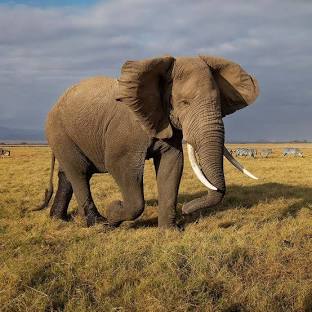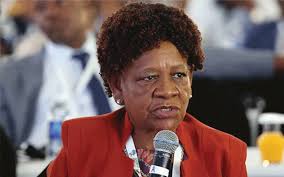
John Cassim
Zimbabwe has called for the lifting of the ivory trade ban, arguing that trading its existing stockpiles will raise much-needed funds to continue wildlife conservation efforts and help combat illegal wildlife trafficking.
Environment, Climate and Wildlife Minister, Evelyn Ndlovu, made this call during the CITES COP-20 Stakeholder Consultation meeting held in Bulawayo this week, ahead of the COP-20 later this year.
“As a country, we are pro-sustainable trade; therefore, we are generally against increased regulation and the curtailment of trade. We are also against the unwarranted inclusion of species in Appendix 1. We oppose one-size-fits-all policies that disregard national wildlife conservation or management successes and local community livelihood considerations,” Minister Evelyn Ndlovu stated.
She added, “It is important to note that Zimbabwe’s objective in being a member of CITES is to sustainably conserve endangered species by joining the global community in the regulation of international trade of such species. We still believe that multilateralism works, and CoP 20 affords us another opportunity to contribute to global conservation policymaking.”

Evelyn Ndlovu, Minister of Environment, Climate and Wildlife
The Environment Minister had earlier indicated that Zimbabwe intends to develop its negotiating position at COP-20 based on issues raised by stakeholders to build national consensus.
“At CoP 19, Zimbabwe raised issues on the need to include rural communities in the CITES decision-making process, the lifting of trade restrictions on international commercial wildlife trade, especially the export of wild-caught live African elephants to areas outside their natural habitat, and the amendment of relevant CITES resolutions to allow African countries to commercially trade their ivory stockpiles as a way of raising revenue for conservation and combating illegal wildlife,” she said.
Meanwhile, the Zimbabwe Parks and Wildlife Management Authority (ZimParks) Director General, Professor Edson Gandiwa, called for participants to unite so that the Zimbabwean voice could be heard.
“We deeply appreciate your commitment to ensuring that Zimbabwe’s voice is heard in global discussions, particularly as we prepare for CoP20 of the CITES Convention. The challenges we face require unity, strategy, and a shared vision.”
He added, “As we prepare for CoP20, Zimbabwe remains committed to advocating for equitable decision-making within CITES. Previous proposals, particularly on voting rights, have highlighted the need for fair representation, ensuring that nations managing significant wildlife populations have a stronger voice in shaping conservation policies.”
During the meeting, it emerged that the global debate on wildlife trade restrictions continues to shape conservation policies, often with far-reaching consequences for nations like Zimbabwe.
Zimbabwe has always accepted that the intention behind stricter regulations is to protect endangered species but has argued that there is a need for a critical assessment of how these policies impact countries that successfully manage large wildlife populations.
Zimbabwe’s conservation model is built on sustainable use, ensuring that wildlife conservation is not only an ecological responsibility but also an economic asset for local communities. Hence, Zimbabwe’s tourism is strongly anchored on wildlife conservation.
Zimbabwe has for a long time complained that decisions that disproportionately affect Southern African nations like Zimbabwe, Botswana, Namibia, and South Africa are made without their fair representation.

Professor Edson Gandiwa, ZimParks Director General.
According to Director General Gandiwa, these SADC countries carry the burden of managing vast wildlife populations, yet policy decisions are often driven by nations that do not experience the realities of conservation on the ground. “At CoP20, we must advocate for stronger regional representation, ensuring that our conservation models are respected, understood, and integrated into global policies,” he said.
“Zimbabwe agrees with elements of the Precautionary Principle in international environmental law, but it is the suspiciously elevated importance of the principle over other equally important principles like sustainable development and permanent sovereignty over natural resources that raises eyebrows.
The principle is being used to thwart proposals on the sustainable utilization of wild species even when the proposal outlines precautionary safeguards against overexploitation,” he added.
